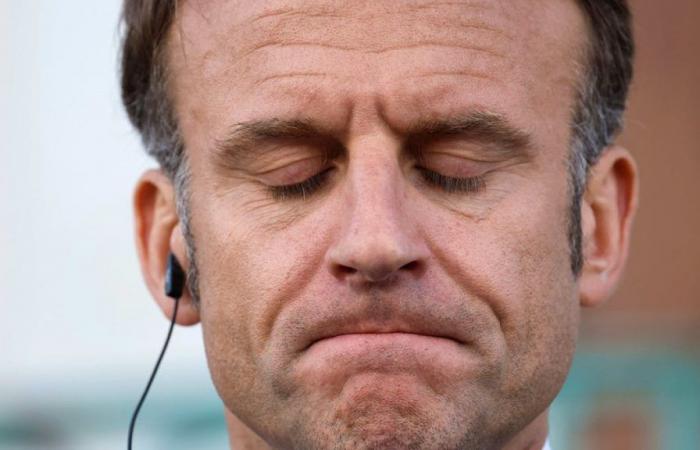Emmanuel Macron, photographed Thursday during his visit to Germany.
AFP
“I take my risk,” Emmanuel Macron likes to say. A fan of poker moves, this young president who wanted to dynamite political life in France and managed to overcome countless crises may have taken too many risks.
After the dissolution of the National Assembly, his former Prime Minister Edouard Philippe made this lapidary judgment: “It is the President of the Republic who killed the presidential majority.”
Macron the gravedigger of Macronism, as observers, opponents and even allies of the head of state increasingly openly affirm?
The shock decision to call legislative elections on the evening of his camp’s defeat in the European elections in any case served as an accelerator for an end to his reign that was perceptible from the start of this second five-year term, which was hampered by the absence of an absolute majority.
Once adored by those who accompanied his meteoric rise, respected by those who joined him once in power, Emmanuel Macron, who risks no longer having all the levers after July 7 and will not be able to run for a third term in 2027, is today abandoned or scorned by many supporters.
“Politicians’ desire for revenge”
This rejection, spontaneous and uninhibited, is evident among many French people, opening the way a little more to the extreme right of the National Rally (RN), led by Marine Le Pen and Jordan Bardella.
“It’s not that I support Jordan Bardella, but I want Macron to be as humiliated as possible,” says a fifty-year-old who voted for the National Rally in the European elections.
“Clearance is taking hold,” squeaks François Patriat, who was one of the first faithful and will remain among the last whatever happens. For the boss of the Macronist senators, “there is a desire for revenge from politicians who could not support his arrival”.
It must be said that she shook up the “old world” which was then mocked by those around her.
Born in Amiens, where he met his future wife Brigitte, twenty-five years his senior, this son of doctors increased his daring and successes to conquer Paris.
At the Élysée at 39
With the same self-confidence, perhaps based on his initial transgression. “He fell in love with his drama teacher at 16, he said he was going to marry her and he married her. That’s pretty tough stuff,” says a former classmate from the ENA (National School of Administration, the breeding ground for French senior civil servants).
When he chose in 2016 to free himself from socialist president François Hollande, the challenge seemed impossible for this finance inspector who worked with the philosopher Paul Ricoeur before being enlisted at the Élysée and then as Minister of the Economy.
But he does it, creates En Marche! – EM, like his initials – to personalize the adventure. And, on May 7, 2017, the candidate who promotes the “Revolution” in his book wins the presidential election at only 39 years old.
Even at 46 today, his temples white after seven years at the Elysée, Emmanuel Macron remains the youngest president of the Fifth Republic.
“I am the product of a form of brutality of History, a break-in because France was unhappy and worried,” said later the man who presents himself as an “incorrigible optimist.”
“President of the rich”
On the evening of the victory, after a slow solitary march to the sound of the European anthem, he pledged in front of the Louvre Pyramid to do “everything” so that the French “no longer have any reason to vote for the extremes.”
An oath that will pursue him, as the RN rises, today at the gates of power.
Coming from the social-liberal left, Emmanuel Macron was elected in the center on the promise of a progressive “overcoming” of traditional divisions.
Its economic doctrine has one unshakable constant: the pro-business supply-side policy. And a dogma: the refusal of tax increases, even if it is to make the ultra-rich contribute.
He defends the image of the “first in line”, the one who succeeds and can pull the less well-off in his climb. This is what justifies the abolition of the solidarity tax on wealth (ISF), and which immediately earns the former investment banker at Rothschild the label of “president of the rich”.
“Much too techno” speech
Retirement at 64, imposed forceps despite rare protest in the streets and in Parliament, reinforces this image.
“If I loved money, I wouldn’t have gone into politics,” he replies.
The president is convinced of this, his economic record speaks for him: reindustrialization, with this much-vaunted title of the most attractive country in Europe for foreign investments; and the end of mass unemployment, about which we talk too little in his eyes.
He would like to be credited for the first successes of his “French-style ecology”, but around him, we recognize a discourse that is “much too techno”.
And he admits that he has not gone far enough on “emancipation” and “equality of opportunity.”
And then, Emmanuel Macron is also a crisis president. Anti-tax revolt of the yellow vests, Covid-19 pandemic, war in Ukraine, urban riots… The “return of tragedy in History” that he narrates in his speeches, he faces on the front line.
So many crises from which he somehow manages to escape.
“He is the great European of his time”
The “great debates” to appease the “France of the roundabouts” help to forge the idea of a president who dares to “make contact”. The reopening of schools despite the pandemic, in May 2020, will prove to be the right intuition.
In Europe, his voice carries, even when it offends.
“We must not quibble. He is the great European of his time,” applauds Daniel Cohn-Bendit, even though he has distanced himself.
For the Franco-German ecologist, “Macron’s problem is sometimes his character, being convinced of being right”. This “hubris” denounced by the late Gérard Collomb, the former mayor of Lyon who left the Ministry of the Interior warning against the “lack of humility” of the Macronists.
By dint of wanting to be on the front line, the head of state, whom his diplomatic advisers willingly present as a mediator-president, is often misunderstood.
When Moscow invaded Ukraine in February 2022, France’s support for kyiv was in unison with the West. But Emmanuel Macron annoys a number of allies by continuing to dialogue with Vladimir Putin and calling for “not to humiliate Russia”.
Two years later, it’s the opposite: by refusing to rule out sending troops to Ukrainian soil, the French president attracts Western criticism.
“At the same time” then to the right
Emmanuel Macron has a formula to describe Macronism: “at the same time” left and right. But over time, he moved further and further to the right, at the risk of being accused of opportunism.
The same one which is inspired by an old slogan of the New Anticapitalist Party to get re-elected in 2022 (“our lives are worth more than their profits”) takes up, later, that of the far right Eric Zemmour version, “so that France remains France. From the art of “triangulation”, which consists of picking at the lexical or ideological lands of adversaries to pull the rug out from under them.
The immigration law, passed at the end of 2023 with the voices of the far right which applauds an “ideological victory” over “national preference”, already seals a point of no return for many historical “marchers”.
“He is turning his back on the doctrinal software of 2017 and on humanist values,” laments his former special advisor Philippe Grangeon.
For an influential member of his entourage, however, there is no “rightward turn”: “the president is adapting to an opinion that is changing.”
“He has a plasticity, an incredible self-confidence which is at the same time his strength and his weakness,” analyzed Marine Le Pen, his rival in the second round of the presidential elections in 2017 and in 2022, with whom a lasting face-off has been established.
“He’s tricking you”
Others accuse him of having contributed to the rise of the extremes. He responds that he has twice beaten the extreme right in the supreme election.
With varying results, he has multiplied initiatives – gadgets, his detractors say – to get out of difficult times, to bypass these intermediary bodies that he considers responsible for a form of inertia, or to overcome the absence of an absolute majority in the second five-year term.
But the method of government of this “Jupiterian” president remains vertical. And, if he has calmed down a little and sketched a few mea culpa, the little sentences from the beginning about the “Gauls resistant to change” or the unemployed who would only have to “cross the street” to find a job left traces. “There are a lot of people who think I’m haughty,” he admits.
However, this boxing fan can have a warm touch.
“He is extraordinarily seductive in direct relationship so he tricks you,” says a historical supporter. “Isn’t he tricking himself?”
At the time of the dissolution, the weight of his entourage, mainly male, in this palace at 55 rue du Faubourg Saint-Honoré which confines and isolates, is more criticized than ever.
Alone
“He has always preferred blows, and their “blast” effect, to the consequences of a decision,” says a former advisor to the executive. “He has no field networks. The people around him are the same, they do not represent the mood of the times,” adds a former government leader.
Few people dare to tell him that he is wrong. Brigitte Macron is one of them. “She has always been an agent of temperance,” summarizes her comrade from the ENA.
Emmanuel Macron brushes aside these criticisms: “The most difficult decisions, you make them alone.”
(afp)







